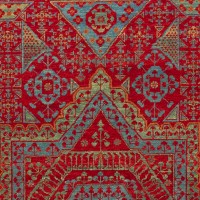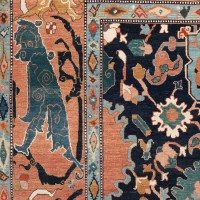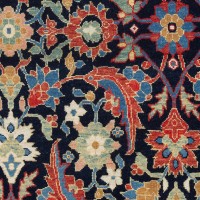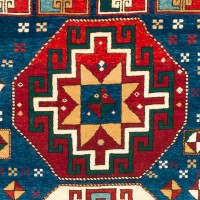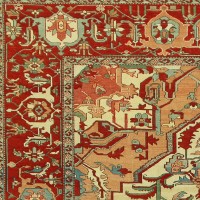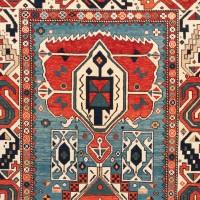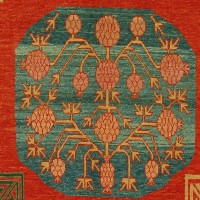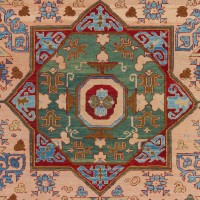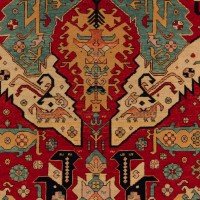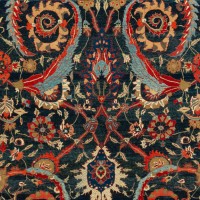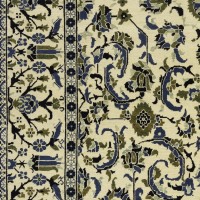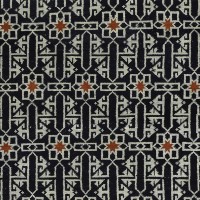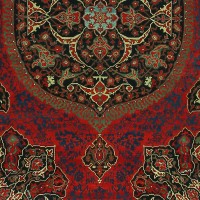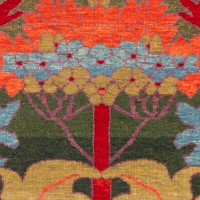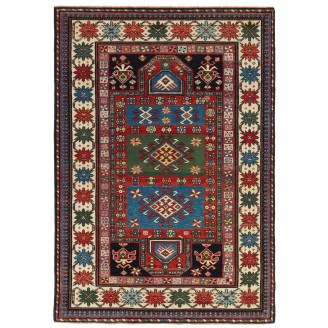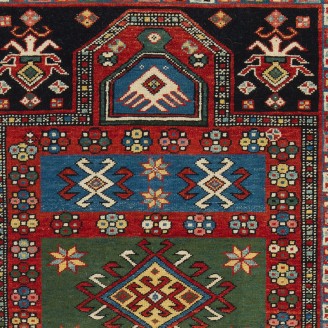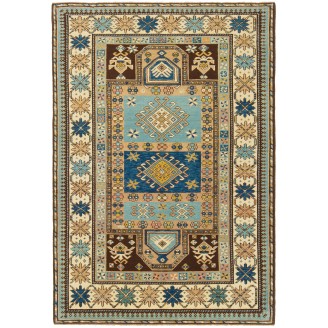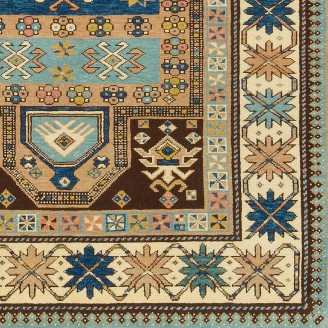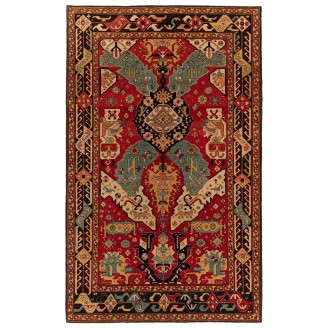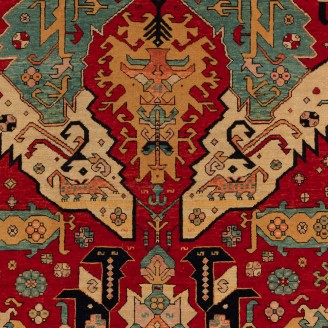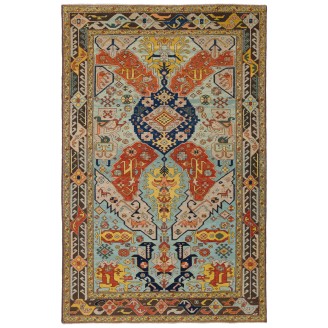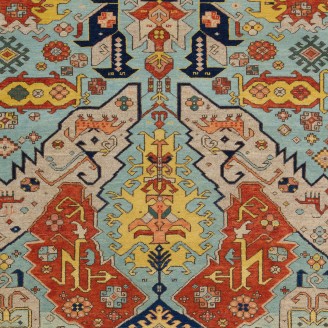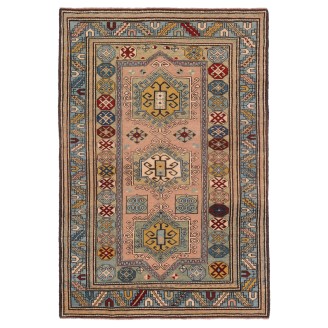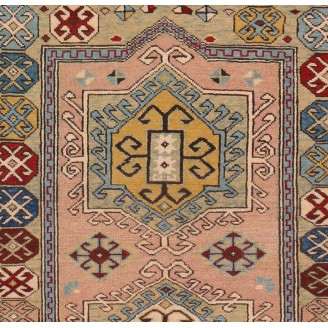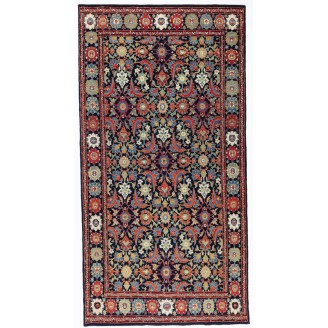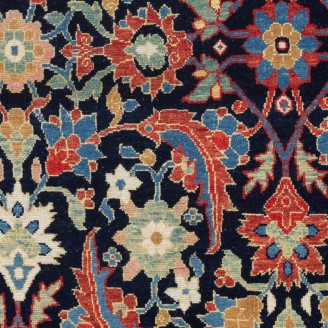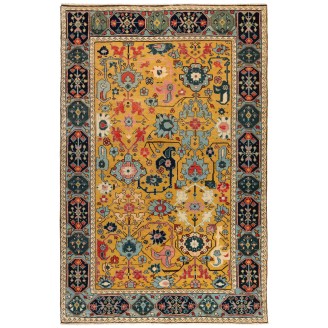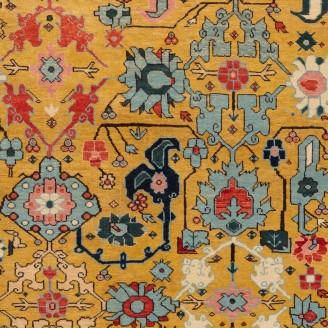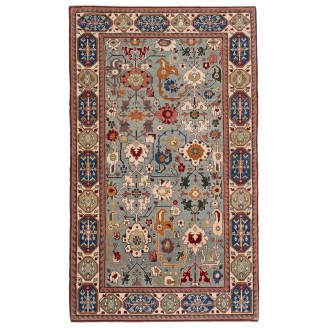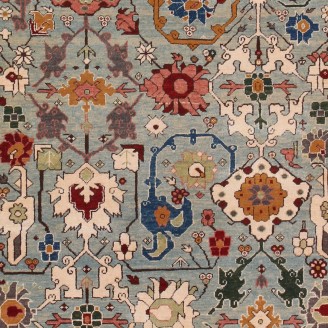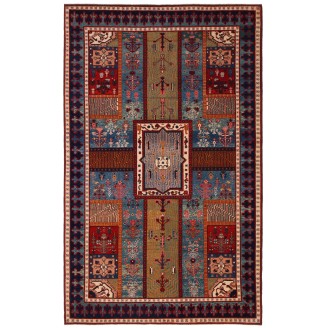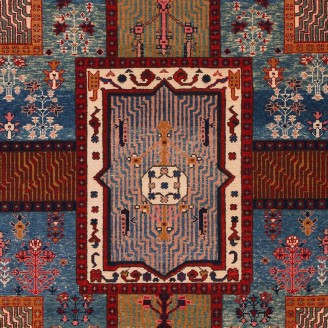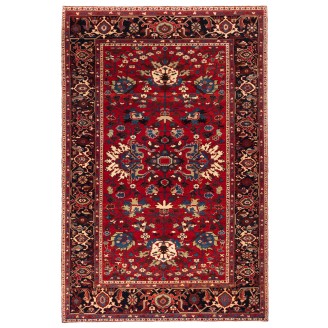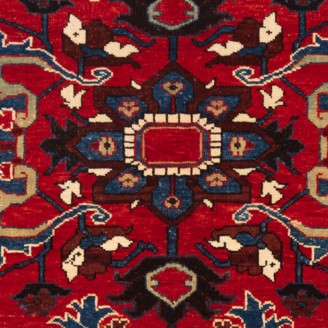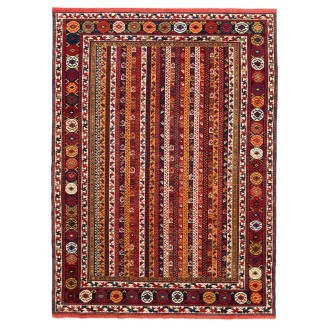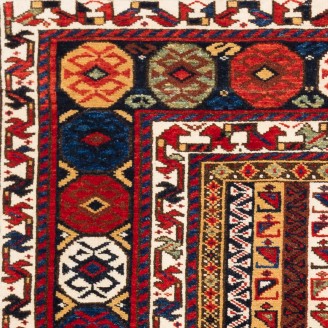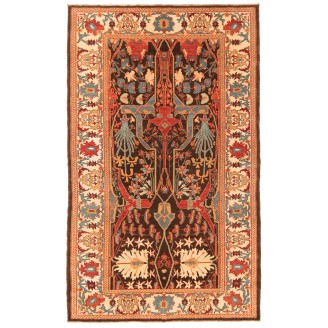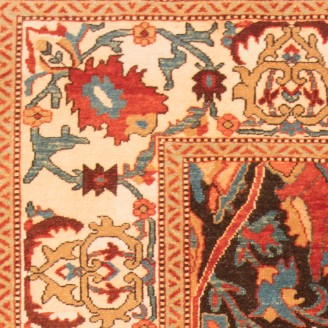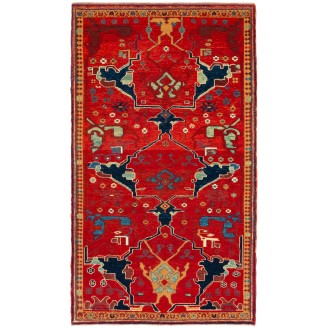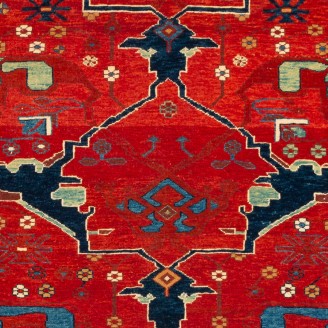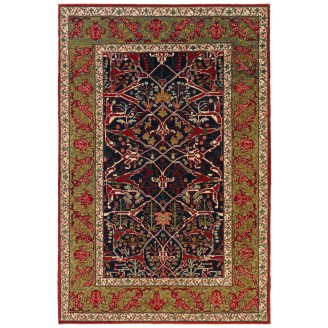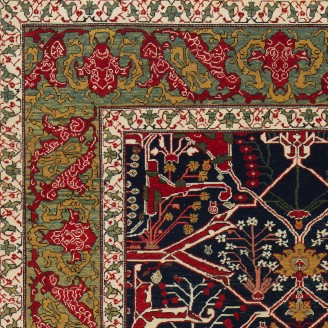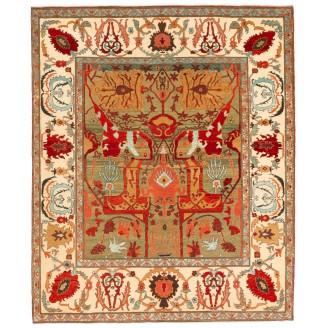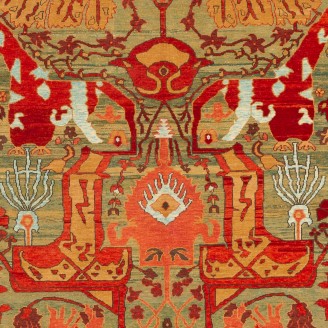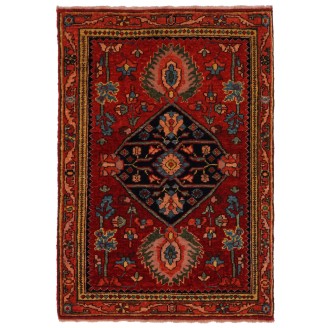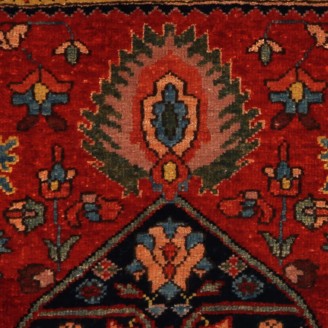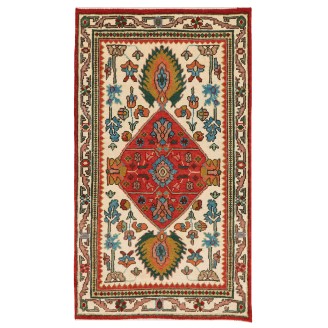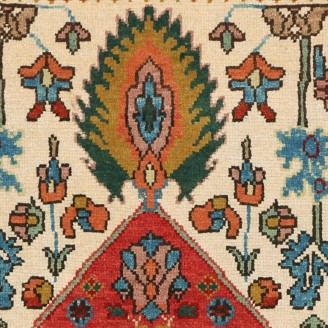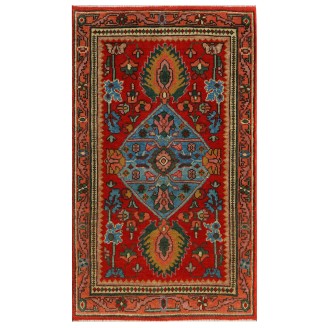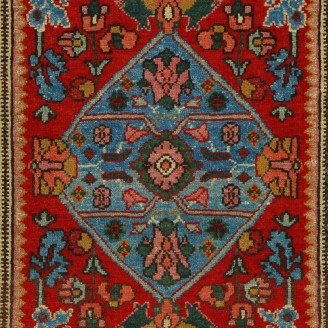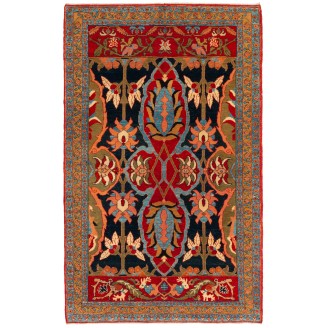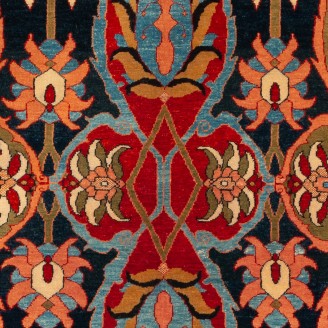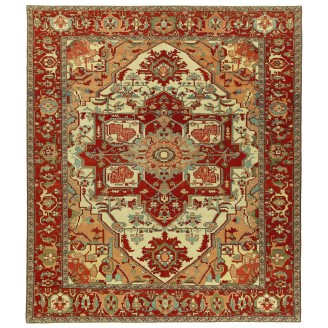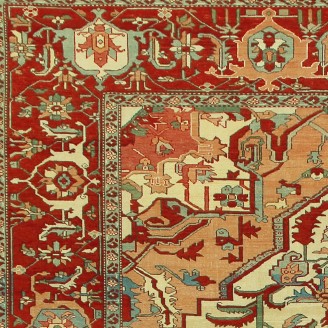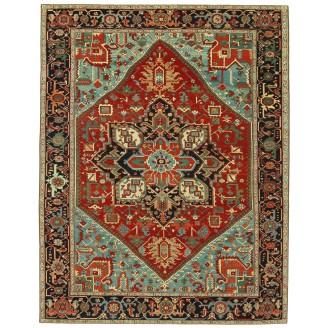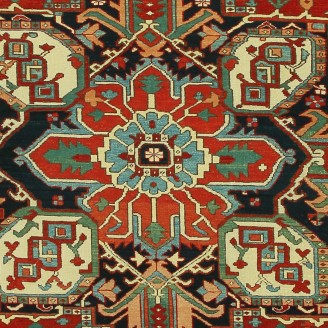Model: ART00475
Dimensions: 4'3" X 6'0"(130cm x 183cm)
The design source of the rug comes from the book Tapis du Caucase - Rugs of the Caucasus, Ian Bennett & Aziz Bassoul, The Nicholas Sursock Museum, Beirut, Lebanon 2003, nr.46. This is a double migrab prayer rug from the late 19th century, Genje region, Caucasus area. There are hooked medallions ..
Price:
$2,800
Ex Tax:$2,800
Model: ART00429
Dimensions: 4'3" X 6'0"(130cm x 185cm)
The source of the rug comes from the book Tapis du Caucase - Rugs of the Caucasus, Ian Bennett & Aziz Bassoul, The Nicholas Sursock Museum, Beirut, Lebanon 2003, nr.46. This is a double migrab prayer rug from the late 19th century, Genje region, Caucasus area. There are hooked medallions and flo..
Price:
$2,700
Ex Tax:$2,700
Model: ART00392
Dimensions: 5'8" X 9'1"(173cm x 279cm)
There has long been a fascination with the symbolism of the dragon and its depiction in carpet weavings. The design of ‘Dragon’ carpets consists of a field pattern composed of different colored overlaid lattices formed of pointed, serrated leaves creating intersecting lozenges, which alternately con..
Price:
$8,300
Ex Tax:$8,300
Model: ART00498
Dimensions: 5'6" X 8'7"(170cm x 263cm)
There has long been a fascination with the symbolism of the dragon and its depiction in carpet weavings. The design of ‘Dragon’ carpets consists of a field pattern composed of different colored overlaid lattices formed of pointed, serrated leaves creating intersecting lozenges, which alternately con..
Price:
$5,000
Ex Tax:$5,000
Model: ART00422
Dimensions: 4'1" X 5'10"(125cm x 180cm)
This is another Kazak example of the Fachralo is a town north of Lori-Pambak and just southwest of Bordjalou, from the late 19th century, Caucasus area. It has given its name to a number of usually small, boldly designed, and brilliantly colored Kazak rugs but, although this has proved a useful desc..
Price:
$2,500
Ex Tax:$2,500
Model: ART00218
Dimensions: 5'1" X 9'10"(157cm x 302cm)
The source of the rug comes from the book Antique Rugs of Kurdistan A Historical Legacy of Woven Art, James D. Burns, 2002 nr.31. This blue background rug has a variation of masi awita (fish around the lotus) pattern from Senna, Eastern Kurdistan area late 19th century. The field design on this rug ..
Price:
$8,800
Ex Tax:$8,800
Model: ART00371
Dimensions: 4'5" X 6'11"(137cm x 211cm)
The source of the rug comes from the book Antique Rugs of Kurdistan A Historical Legacy of Woven Art, James D. Burns, 2002 nr.40. This offset pattern is composed of palmettes and stems with large forked leaves, one has the impression that it is only part of a larger scheme designed 17th-century rug ..
Price:
$4,900
Ex Tax:$4,900
Model: ART00301
Dimensions: 4'3" X 7'0"(132cm x 215cm)
The source of the rug comes from the book Antique Rugs of Kurdistan A Historical Legacy of Woven Art, James D. Burns, 2002 nr.40. This offset pattern is composed of palmettes and stems with large forked leaves, one has the impression that it is only part of a larger scheme designed 17th-century rug ..
Price:
$4,800
Ex Tax:$4,800
Model: ART00488
Dimensions: 4'9" X 7'6"(145cm x 230cm)
The source of the rug comes from the book Islamic Carpets, Joseph V. McMullan, Near Eastern Art Research Center Inc., New York 1965 nr.28. This Persian Garden design rug belongs to the second half 18th century in the Persia area. The design of this rug is based on the Formal Persian Garden. There is..
Price:
$7,800
Ex Tax:$7,800
Model: ARTK0007
Dimensions: 9'2" X 5'11"(280cm x 182cm)
This is a central medallion with connected palmette and flowers designed carpet 19th century from Garrus ( Gerous or Garus ) region, Eastern Kurdistan area. Garrus is located in the foothills approaching the flatlands of Persia, Garrus has been a significant Kurdish city since antiquity when it was ..
Price:
$0
Ex Tax:$0
Model: ARTK0029
Dimensions: 4'2" X 5'8"(129cm x 174cm)
The source of rug comes from the book Tapis du Caucase - Rugs of the Caucasus, Ian Bennett & Aziz Bassoul, The Nicholas Sursock Museum, Beirut, Lebanon 2003, nr.42 and Oriental Rugs Volume 1 Caucasian, Ian Bennett, Oriental Textile Press, Aberdeen 1993, nr.171-172 and Caucasian Carpets, E. Gans-Reud..
Price:
$0
Ex Tax:$0
Model: ARTK0006
Dimensions: 4'5" X 7'5"(136cm x 228cm)
The source of the rug comes from the book Islamic Carpets, Joseph V. McMullan, Near Eastern Art Research Center Inc., New York 1965 nr.22. This is a system of arabesque-designed 19th-century rugs from Gerous ( Garrus or Garus ) region, Eastern Kurdistan area. This rug is a splendid echo of the Arabe..
Price:
$0
Ex Tax:$0
Model: ART00245
Dimensions: 3'3" X 5'6"(101cm x 170cm)
The source of the rug comes from the book Islamic Carpets, Joseph V. McMullan, Near Eastern Art Research Center Inc., New York 1965 nr.22. This is a system of arabesque-designed 19th-century rugs from Gerous ( Garrus or Garus ) region, Eastern Kurdistan area. This rug is a splendid echo of the Arabe..
Price:
$4,500
Ex Tax:$4,500
Model: ART00432
Dimensions: 6'6" X 9'10"(200cm x 300cm)
The source of the rug comes from the book Islamic Carpets, Joseph V. McMullan, Near Eastern Art Research Center Inc., New York 1965 nr.22. This is a system of arabesque-designed 19th-century rugs from Gerous ( Garrus or Garus ) region, Eastern Kurdistan area. This rug is a splendid echo of the Arabe..
Price:
$12,500
Ex Tax:$12,500
Model: ART00221
Dimensions: 6'2" X 7'5"(188cm x 227cm)
The source of the rug comes from the book Islamic Carpets, Joseph V. McMullan, Near Eastern Art Research Center Inc., New York 1965 nr.22. This is a system of arabesque-designed 19th-century rugs from Gerous ( Garrus or Garus ) region, Eastern Kurdistan area. This rug is a splendid echo of the Arabe..
Price:
$7,900
Ex Tax:$7,900
Model: ART00063
Dimensions: 1'7" X 2'3"(50cm x 70cm)
The most dramatic of the Gerous ( Garrus, Gerus, Garus ) carpets are those with an "asymmetric" design. Only a section of the original is shown, in the same way, many Lotto carpets were woven. It is difficult to guess the size of these carpets from a photo, but here we enter the area of the "Wagireh..
Price:
$825
Ex Tax:$825
Model: ART00071
Dimensions: 1'9" X 3'1"(54cm x 95cm)
The most dramatic of the Gerous ( Garrus, Gerus, Garus ) carpets are those with an "asymmetric" design. Only a section of the original is shown, in the same way, many Lotto carpets were woven. It is difficult to guess the size of these carpets from a photo, but here we enter the area of the "Wagireh..
Price:
$825
Ex Tax:$825
Model: ART00072
Dimensions: 1'8" X 2'10"(53cm x 88cm)
The most dramatic of the Gerous ( Garrus, Gerus, Garus ) carpets are those with an "asymmetric" design. Only a section of the original is shown, in the same way, many Lotto carpets were woven. It is difficult to guess the size of these carpets from a photo, but here we enter the area of the "Wagireh..
Price:
$0
Ex Tax:$0
Model: ART00246
Dimensions: 3'6" X 5'8"(108cm x 174cm)
The most dramatic of the Gerous ( Garrus, Gerus, Garus ) carpets are those with an "asymmetric" design. Only a section of the original is shown, in the same way, many Lotto carpets were woven. It is difficult to guess the size of these carpets from a photo, but here we enter the area of the "Wagireh..
Price:
$3,500
Ex Tax:$3,500
Model: ARTW0007
Dimensions: 11'9" X 13'6"(360cm x 413cm)
This is a medallion design rug from the late 19th century, Heriz region, Northwest Persia area. Heriz ( Heris ) is a special Turkish knot weaving area of Persia, including many villages, located east of Tabriz in northwest Persia. Weaving has been carried on in the Heriz area certainly since the beg..
Price:
$0
Ex Tax:$0
Model: ARTW0008
Dimensions: 9'11" X 12'8"(304cm x 387cm)
This is a medallion design rug from the late 19th century, Heriz region, Northwest Persia area. Heriz ( Heris ) is a special Turkish knot weaving area of Persia, including many villages, located east of Tabriz in northwest Persia. Weaving has been carried on in the Heriz area certainly since the beg..
Price:
$0
Ex Tax:$0
